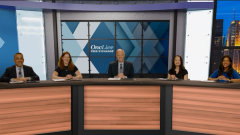
Colorectal Cancer: Evolving Role of ctDNA Testing in Practice
A brief review of how circulating tumor DNA testing has impacted the real-world management of patients with metastatic colorectal cancer.
Episodes in this series

Transcript:
John L. Marshall, MD: Tani, take us home on this topic. Where do you see MRD [minimal residual disease] ctDNA testing going in CRC [colorectal cancer]? Is it here to stay? Where are we going with it?
Tanios Bekaii-Saab, MD, FACP: It’s definitely here to stay. As we learn through the great work that everyone in the table is doing, we will understand more and more how to place it. I think it’s going to become a standard practice once we get a little bit more clarity about how to act on a test. We think we do in select cases. We have these long discussions with patients right now. We’ve always had the scan anxiety; now we have the MRD anxiety. It is not just anxiety-provoking for the patient, but for the provider as well, as we get challenged. But it’s good to be challenged because that brings back the right questions into clinical trials.
I do think that all the studies that have been presented, mostly observational at this point in time, continue to point in a direction that this is likely going to be a predictive test. So I think we’re moving in a good direction. In clinic today, as you’ve heard, we do it selectively in case-by-case spaces. In some instances, in the lowest-risk patients, perhaps. For some there’s a comfort zone to do it broadly. There’s a lot of clinical trials that are out there. I think the next few years are going to look exciting. One of the things I’m even more excited about is it will increase our efficiency in building the next wave of clinical trials. We’re going to have our answers quicker, we’re going to be able to move with the right questions that today take about 10 years to answer. We’ll perhaps shorten that to 1 or 2 years.
John L. Marshall, MD: We give so many people adjuvant therapy that don’t need it or are not benefiting from it. To just make us sufficient in that space is worth it.
Tanios Bekaii-Saab, MD, FACP: Most don’t benefit.
John L. Marshall, MD: Again, thanks very much for all you do and for this rich and informative discussion.
Transcript edited for clarity.




































